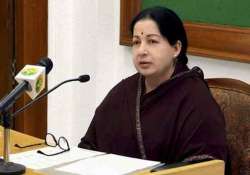Jaya flays India's offer to train Lankan Naval officials
Chennai: Expressing dismay at India's offer to train Sri Lankan Naval officials, Tamil Nadu Chief Minister J Jayalalithaa has demanded that the Prime Minister review this “insensitive policy of defence co-operation” as it was in

Chennai: Expressing dismay at India's offer to train Sri Lankan Naval officials, Tamil Nadu Chief Minister J Jayalalithaa has demanded that the Prime Minister review this “insensitive policy of defence co-operation” as it was in “utter disregard” of sentiments of people of the state.
“I wish to convey our strong protest against this insensitive policy of defence co-operation with Sri Lanka, which totally ignores the impact it may have upon the feelings of the people of Tamil Nadu,” she said in a letter to Prime Minister Manmohan Singh yesterday.
She was referring to the offer for a four-year Bachelor of Technology course made by visiting Indian Navy chief Admiral D K Joshi on November 29 when he called on President Mahinda Rajapaksa in Colombo.
Stating that this had come as a ‘great shock' to people of Tamil Nadu, Jayalalithaa said “In utter disregard of the sentiments and emotions of the people of Tamil Nadu, the Government of India is persisting with the policy of defence co-operation with the Sri Lankan Armed Forces.”
She said there was “a deep and widespread sentiment” prevailing in Tamil Nadu about the need to hold the Sri Lankan regime to account for the acts of “genocide and war crimes” in the closing stages of the civil in the island nation and continued “discrimination” against the Tamil minority there.
The Centre's commitment was “tantamount” to actively working with the Sri Lankan regime and providing them with necessary wherewithal to act even more strongly not only against the Tamil minority in the island, but also against the poor Indian fishermen, she added.
Recalling her earlier letters opposing imparting training to Sri Lankan defence personnel in India, she urged Singh to urgently review the policy and instruct the Ministry of Defence not to pursue the proposed training programme.
Jayalalithaa also opposed the hike in diesel prices by 50 paise effected last night and demanded its rollback, saying it would affect poor people.
“The hike would lead to increase in prices of commodities. Fare of private buses, including services to offices, schools would also increase. As a result, poor people would be severely affected.”
“I wish to convey our strong protest against this insensitive policy of defence co-operation with Sri Lanka, which totally ignores the impact it may have upon the feelings of the people of Tamil Nadu,” she said in a letter to Prime Minister Manmohan Singh yesterday.
She was referring to the offer for a four-year Bachelor of Technology course made by visiting Indian Navy chief Admiral D K Joshi on November 29 when he called on President Mahinda Rajapaksa in Colombo.
Stating that this had come as a ‘great shock' to people of Tamil Nadu, Jayalalithaa said “In utter disregard of the sentiments and emotions of the people of Tamil Nadu, the Government of India is persisting with the policy of defence co-operation with the Sri Lankan Armed Forces.”
She said there was “a deep and widespread sentiment” prevailing in Tamil Nadu about the need to hold the Sri Lankan regime to account for the acts of “genocide and war crimes” in the closing stages of the civil in the island nation and continued “discrimination” against the Tamil minority there.
The Centre's commitment was “tantamount” to actively working with the Sri Lankan regime and providing them with necessary wherewithal to act even more strongly not only against the Tamil minority in the island, but also against the poor Indian fishermen, she added.
Recalling her earlier letters opposing imparting training to Sri Lankan defence personnel in India, she urged Singh to urgently review the policy and instruct the Ministry of Defence not to pursue the proposed training programme.
Jayalalithaa also opposed the hike in diesel prices by 50 paise effected last night and demanded its rollback, saying it would affect poor people.
“The hike would lead to increase in prices of commodities. Fare of private buses, including services to offices, schools would also increase. As a result, poor people would be severely affected.”